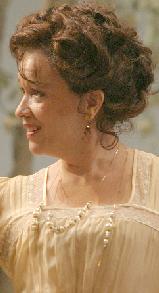SITE GUIDE
SEARCH
REVIEWS
FEATURES
NEWS
Etcetera and
Short Term Listings
LISTINGS
Broadway
Off-Broadway
NYC Restaurants
BOOKS and CDs
OTHER PLACES
Berkshires
London
California
New Jersey
DC
Philadelphia
Elsewhere
QUOTES
TKTS
PLAYWRIGHTS' ALBUMS
LETTERS TO EDITOR
FILM
LINKS
MISCELLANEOUS
Free Updates
Masthead
Writing for Us
A CurtainUpBerkshire Review
The Cherry Orchard
By Elyse Sommer
|
Oh, my dear, my lovely, beautiful orchard! My life, my youth, my happiness, good-by!
---Liyubov Ranyevskaya, Act IV
|

Linda Emond (Photo: Richard Feldman) |
People who saw Linda Emond's remarkable opening monologue as the Homebody of Tony Kushner's Homebody/Kabul, will immediately be reminded of a similar table and chair that served as that memorable monologue's only props. (Our Review). Could this be Greif's way of subtly announcing that we were about to see another bravura performance from Ms. Emond?
For a fleeting moment it occurred to me that he might have cast Ms. Emond to dish up a new twist by somehow linking the character of the English woman she so elegantly played in the Kushner play to Chekhov's elegant LiyubovRanyevskaya. After all, the Homebody seeks escape from her unhappy marriage by reading about and eventually visiting a foreign world (Afghanistan), whereas Madame Ranyevskaya seeks solace from an unhappy love affair in Paris by returning to the home she adores, even though it too holds tragic memories (an alcoholic husband, the death of a son).
In this era of directorial supremacy, anything is possible and I've seen enough drastically revised classics to prove it. In case of The Cherry Orchard this dates back to Joshua Logan's 1950 The Wisteria Tree in which re-imagined the Russian cherry orchard as an American plantation in the deep South of 1890 and which starred Helen Hayes. Purists can rest easy that Greif hasn't actually rewritten Chekhov's brilliant mix of comedy and tragedy . But not too easy.
The director has put his stamp on this production in ways that too often de-Chekovize the humanity of even its minor characters. Thus, the lovely and gifted Ms. Emond, who should have no worries about stepping into a role created by Chekhov's own wife, Olga Knipper, and since then has drawn top drawer interpreters throughout the world, is prevented from fully realizing the recklessness and charm of this Liyubov. This is a problem that also applies to most of her colleagues, whose characters call for interpretation that pays close attention to easily eluded subtleties. The director's tendency to steer actors to capture the fine details of this human tragi-comedy is especially evident in Ritchie Coster's Yermolai Lopakhin, the former serf turned successful businessman and who represents both the best and worst of the encroaching new order. It is Lopakhin who takes his seat at that little table and leads the way for the parade of people who people the Chekhovian landscape.
I have no problem with a less than fully furnished setting for estate's interior but Greif's visual concept seems rather forced in its references to Chekhov's text (the gray background of the opening image may be intended to bring to mind Chekhov's literal reference to his play as a metaphor for the dawning of a new world that will "outlive the gray dawdle") and the WTF's own move from an long-occupied home (albeit to a new home under a still unknown new leader that doesn't call for a long-distance move for anyone but the departing producing director Michael Ritchie). To be sure, Greif does not deprive us of a cherry orchard that transforms the stage into a typically lovely to look at WTF production. However, there's something oxymoronic about rolling out the gorgeous cherry trees like a tea tray on wheels. After all, those blossoming trees symbolize a life style so deeply entrenched that it needs an axe to be uprooted. As if aware of this, Greif turns the final axing of the orchard into an interminable slow-motion illustrated act that upstages the left behind old butler Firs' (Frank Raiter) poignant "Life has gone by, as if I hadn't lived at all." The addition of an adorable little Yorkie does little to clarify the railroad tracks scene's importance in expediting the end of the aristocratic estate life.
The clanging sound effects of the final scene sound like the heavy duty equipment used for the new theater being constructed next to the Adams Memorial Theater and go with the brick columns with which Alan Moyers has flanked the Orchard. While not as obvious and unsubtle as the self-referential stage business in the earlier in the season Midsummer Night's Dream (Our Review), neither do these timely touches do much to make this a most memorable ever Cherry Orchard.
For all my quibbles, even a less than perfect Cherry Orchard can't fail to give us some of the enduring magic of Chekhov's portrait of those recklessly clinging to a passing world and those embracing it with hope and open arms. All of the actors, even Coster during the heartwrenching non-proposal to Madame Ranyevskaya's daughter Varya (the excellent Michelle Williams), have moments of mining the play's emotional gold. Besides Williams this includes, Reed Birney as Liubov's ineffectual brother; Chris Messina as the perennial student espousing the beliefs of revolution to come; Brenda Wehle as the family's governess and card trick expert; Jessica Stone as the pert servant Dunyasha who loses the dashing valet (an aptly dashing Jason Kaufman) she loves to his ambition for a less provincial life; and Lee Wilkof as a landowner who has no orchard to convert into homes for the nouveau rich but finds that there are people willing to lease his land in order to extract the clay from its soil.
Paul Schmidt's translation works well for a production so determinedly linking the Festival's changing physical plant and managerial leadership to Chekhov's saga of people abandoning one home for another. He can thus be forgiven if his attempts to uncover relevancy in the text are at times a bit too jarringly contemporary.
Much as I love Chekhov, I hope when the Festival settles into its expanded and modernized venues (which will hopefully have acoustics better than the current ones which often make for unclear and shrill sounding line delivery) that the Main Stage as well as the smaller theater will free itself to "outlive the gray dawdle" of mostly revivals and make way for the voices of new playwrights.
For anyone unfamiliar with plot, here's a nutshell-sized synopsis: The play depicts the passing of an era by chronicling how a wealthy family loses its beloved cherry orchard and estate to a man of the rising middle class. The action, such as it is, begins with the return of Madame Ranevskayar to her estate after a five year stay in Paris with a lover who has deserted her for another woman. She discovers that you can't go home again when the interest on the mortgage is way past due and that survival demands that she heed the advice of new businessmen, a former serf, to let the estate's cherry orchard be chopped down and developed as homes for the middle class that is replacing her aristocratic set. As Chekhov himself is said to have summed it up: Act One -- they are wondering whether they will have to sell the cherry orchard; Act Two -- they are going to sell the cherry orchard; Act Three -- the cherry orchard is sold; Act Four -- what they do after the cherry orchard is sold.
| The Cherry Orchard By Anton Chekhov Directed by Michael Greif Cast: Linda Emond (Lyubov Andreevna Ranevskaya), Reed Birney (Leonid Gayev), Frank Raiter (Firs), Jessica Chastain (Anya), and Michelle Williams (Varya); also Ritchie Coster, John Forest, Jonathan Fried, Jason Kaufman, Chris Messina, Jessica Stone, Brenda Wehle and Lee Wilkof. Set : Allen Moyer Costumes: Ilona Somogyi Lights: James . Ingalls Sound: Matthew Burton Running Time: Two hours, 20 minutes includes one intermission Williamstown Theatre Festival, Adams Memorial Theatre, 1000 Main Street, Williamstown, MA (413/597-3400) web address August 11 through August 22, 2004 Ticket prices range from $20 to $50 depending on the performance date and seating location. Tuesday through Friday evening at 8:00pm, Saturday evening at 8:30pm. Matinees are Thursdays at 3:00pm, Saturday at 4:00pm, and Sunday at 2:00pm. Reviewed by Elyse Sommer based on August 14th performance |



Retold by Tina Packer of Shakespeare & Co.
Click image to buy.
Our Review

Berkshire Hikes &
The Berkshire Book
Great Places to Eat, Shop, Stay
Sheffield Pottery
In Lee:
Morgan House Inn & Restaurant
In Lenox:
Andrew De Vries Sculptures
In Williamstown
Pappa Charlie's Deli
Thai Garden
Listing information: esommer@curtainup.com

6,500 Comparative Phrases including 800 Shakespearean Metaphors by CurtainUp's editor.
Click image to buy.
Go here for details and larger image.
